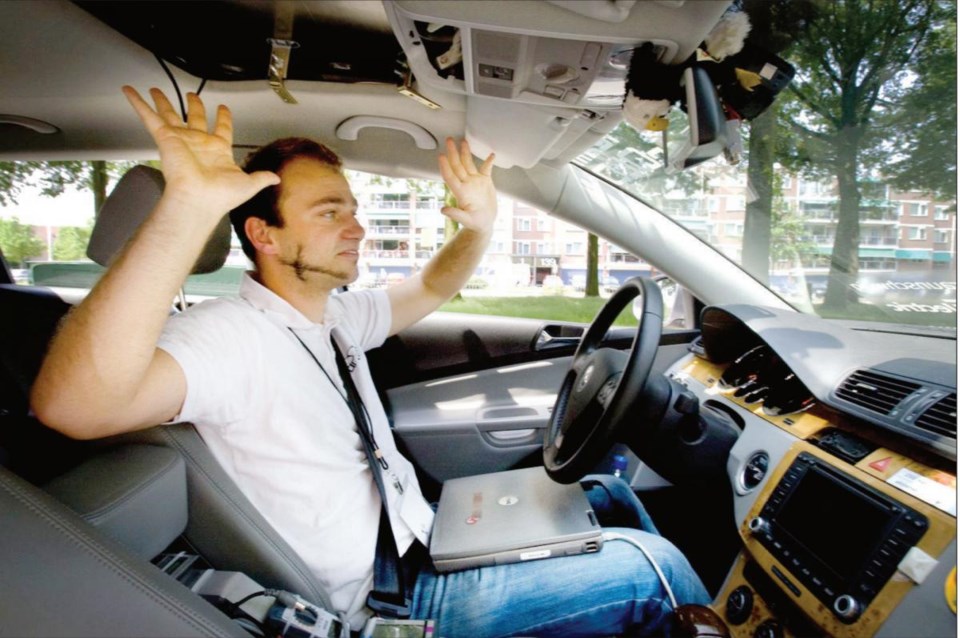In the future, your car will drive itself. And thank goodness for that.
Forget electric vehicles, forget hydrogen fuel-cell experiments, forget about F1-style Kinetic Energy Recovery Systems adapted from spidery racecars and affixed to the ol' family crossover.
The Next Big Thing isn't going to be a radical change to the internal combustion engine - that will come, but at a glacial creep.
Instead, the next revolution to hit the automobile will be autonomy; flying cars are out of the question, but autopilot is on the way. In fact, it's pretty much already here.
Witness the success of Google Street View's fleet of autonomous Prii, now having just cracked the 480,000-kilometre mark, crash-free.
Google was slightly surreptitious about releasing info on its robo-rides early on, fearing poor public opinion, but now it trumpets its achievements.
Naturally, folks who've seen the Terminator movies a few too many times (or who remember what Windows 95 was like) reach for the torches and pitchforks whenever autonomous cars get mentioned. However, the fact remains that the few times somebody crashed a Google Streetview car, the machine wasn't in auto-mode and the fender-benders were down to human error.
Here is the biggest problem with modern driving. It's not the traffic. It's not the fuel costs. It's not even the pollution. It's the fact that human beings, by and large, are a bunch of drooling imbeciles.
I should know: I'm one. In polite company, you'd never guess it. Get me behind the wheel and I speed a little bit. I get annoyed at people who don't know how to use a roundabout properly. I take my eyes off the road to fiddle with the stereo.
Google's chief-of-staff has previously called human drivers a bug in the system - our feeble squishy minds are often the weak link in machines that are safer than ever these days. To be honest, this declaration got up my nose a little bit. If people regarded driving as more of a privilege than a right and were required to take the same sort of thorough testing that a motorcycle owner is required to, the roads would be a much safer place.
No need for robo-cars then? If so, then why the huge demand for safety aids like lane-departure warning, collision warning and blind-spot monitoring? Why did I almost get hit by a texting driver when merging onto the highway?
Humans are unlikely to become better drivers as the years progress. Instead, we are becoming more distracted as a population, glued to our smartphones, incapable of resisting sneaking a peek when they buzz with an incoming text.
As we pay less attention, our cars pay more. This week, I was driving a new Ford Escape Platinum - a small crossover that's a Canadian favourite, widely available and affordable. Not only was this little trucklet equipped with blind-spot monitoring and parking sensors, it also had a cross-traffic sensor that can spot approaching cars when backing out into traffic.
Manoeuvering the Escape in a busy supermarket parking lot, I was so surrounded by bings, bongs and beeps, I half expected the dashboard to flash "TILT." My fault for parking it myself - like other Fords, the Escape can parallel-park itself with the push of a button. Moreover, take the little crossover too hard through a wet corner and its so-called Curve Control System (sounds like a girdle to me) can gently apply the brakes to prevent crashing.
Goose the throttle in a modern car, and a drive-by-wire system senses the request for torque and doles out power from the engine based on what the traction control reports, what the steering angle is and, in the case of a sporty hatch like the Mazdaspeed3, will even restrict the horsepower based on gear choice.
Systems like collision mitigation can instantly sense how much brake pressure should be applied to avoid an approaching object and will apply force regardless of how lightly you touch the pedal. Cars equipped with automatic cruise control or similar systems are capable of stopping the vehicle entirely, regardless of driver input.
Further feature creep from the safety systems now includes things like Acura's Lane Keep Assist, which will gently nudge the steering wheel back into line if you drift out of your lane. The 2014 Mercedes-Benz S-class will purportedly have a self-steering system that will stay in the lane through a curvy road - though you'll have to keep your hands on the wheel.
This coming automation of one of the great transportation freedoms used to bother me quite a bit. But think of what a self-driving car would mean for an elderly person who faces having their licence cancelled. Think of the work that could be accomplished by those shuttling into town on a lengthy and futile commute. Think of the risk-reduction that takes the wheel out of a drunk driver's hands, even if someone doesn't grab his keys.
It'll take a while, perhaps more like 10 years rather than five. Soon enough, though, your car will be able to find its way home - just like a faithful horse, rider asleep in its saddle, slowly picking the path back to the barn.
For those of us who still want to drive the old-fashioned way, it shouldn't be too hard to pull HAL's fuse.



